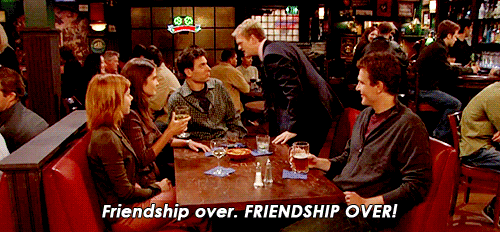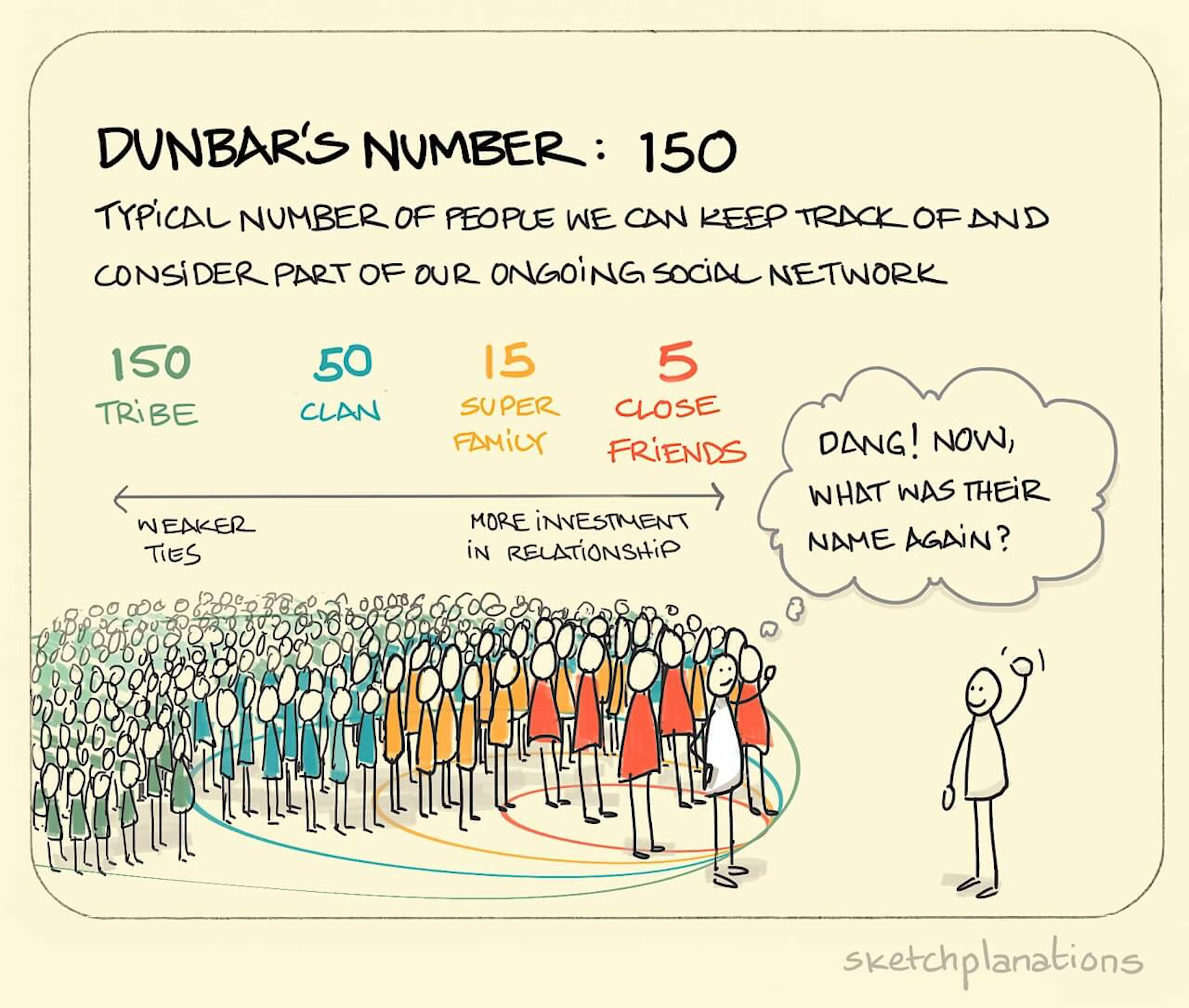Just about when I hit 30 last year, I stumbled upon a Reddit post about friendships on r/MaleLifestyle.
“I really don’t how to start this.. I’ll be honest man I’m 26 and I have to admit I can’t take it anymore. This loneliness is actually killing me…”
And I was like, “that sounds like me!”
The Reddit post1Here’s the Reddit post for anyone curiousled me down a rabbit hole reading a book called We Need to Hang Out and learning about how we form friendships, why friendships fade in your 30s, why we lose friends as we grow old, and most importantly, how to keep friendships strong using a mental tool.
The Great Vanishing Act: Friends in Your 30s
I’ve lived in three different countries in the past decade, most recently moving to London at the age of 28. Although I’m a bit introverted, I’ve always managed to surround myself with friends. I am used to being alone but not lonely.
After moving to London in 2020, I found it difficult to meet new people, make new friends. I missed having multiple plans on weekends. Friendship is important to me. Friendship is important to humans.

Deci and Ryan’s Self-determination theory2Deci, E. L., & Ryan, R. M. (2000). The “What” and “Why” of Goal Pursuits: Human Needs and the Self-Determination of Behavior. Psychological Inquiry, 11(4), 227-268. https://doi.org/10.1207/S15327965PLI1104_01states,
Human beings need three things in order to be content: They need to feel competent at what they do; they need to feel authentic in their lives, and they need to feel connected to others. He considered these three pillars—autonomy, competence, and community—to be intrinsic to human happiness.
Communities are important in friendships and my loneliness was stemming from not having a community. I was losing touch with my old friends, I wasn’t making new friends. I wasn’t happy. So what happened?
The Challenge of Meeting New People in Your 30s
You know, when you hit your 30s, making new friends can feel like quite a challenge. It’s not that it’s impossible, but our lives are so entwined with our careers, family, and personal growth that there’s little time left for socializing.
What about workplaces? Well, not always the best place to find friends. We might spend most of our day there, but colleagues don’t always become our closest friends. They’re often more like proximity acquaintances – people we interact with on a daily basis but never really form a deeper connection with.

As we grow older, many of us become more selective about the company we keep, and we may no longer frequent bars or clubs where new friendships could be formed. The people we do meet are often around our age and already have their own established friend groups, which can make it difficult to break into existing social circles.
And then there’s the point of interests and priorities.
🚨 Quick sidebar: Enjoying what you’re reading? Sign up for my newsletter to get similar actionable insights delivered to your inbox, for free!
Psttt, you will also get a free copy of my ebook, Framework for Thoughts, when you sign up!
Evolving Interests and Priorities in Your 30s
In our 30s, we often find ourselves more at ease with who we are, and that can impact how we approach new friendships. You know what I mean? For instance, I’m way more into cosying up with a Netflix show, a pizza, and a glass of wine than heading out to mingle with strangers I barely know.

What’s great about hitting middle age is that you stop pretending the lies you tell yourself are not lies
Billy Baker
Also, there’s the point of having different interests. I stopped lying to myself at 30 – I don’t enjoy discussions on cars, clubbing, or sports. This means a smaller pool of potential friends who share common goals and hobbies.
One study published3English, T., & Carstensen, L. L. (2014). Selective Narrowing of Social Networks Across Adulthood is Associated With Improved Emotional Experience in Daily Life. International journal of behavioural development, 38(2), 195–202. https://doi.org/10.1177/0165025413515404 – If you want to read the study found that as people age, they become increasingly selective about the friends they choose, placing greater importance on qualities like loyalty and dependability. Additionally, the same study has shown that people tend to form friendships with those who are in similar life stages or share similar experiences, such as having children or being in the same career field.
This can make it harder to form new friendships, as individuals may be more hesitant to let new people into their social circles. As people age, their life experiences become more diverse, which can make it harder to find others who share similar interests and experiences.
Okay but that’s new friends? What about old friends?
Time: The Ultimate Friendship Barrier
In our 30s, many of us lose the proximity we once had with our friends. We no longer see them daily in college or at the gym, and it becomes increasingly difficult to maintain those connections. Many of my friends in their 30s have busy lives filled with work, family and/or a stable relationship, and other responsibilities, leaving little time for socializing.

Ashley Montagu opined many decades ago. “What happens is the family ‘gets together’ alone.”
When you message your friends, once a month, “do you want to hang out?” “YES” and then… radio silence. It’s as if we all just agreed to join the “Schrodinger’s Hangout Club,” where everyone’s both excited to meet up and perpetually trapped in a cosy vortex of Netflix binges.
Technology: A Double-Edged Sword in Friendships
As we live in a digital era, technology plays a crucial role in our daily lives, including our friendships. On one hand, it’s a blessing. Social media platforms and messaging apps allow us to stay connected with our friends, no matter how far apart we may be geographically. It’s never been easier to share updates, photos, and messages with people we care about.
However, there’s a downside. Technology can also create a false sense of connection. We may feel that we’re ‘keeping in touch’ by liking posts or leaving comments, but these interactions lack the depth of face-to-face conversations.

Damn. So many issues make it harder to keep friends as you grow old. What can we do? How do you fix it?
Velvet Hooks: The Solution to Disappearing Friendships
Billy Baker, the author of We Need to Hang Out, says,
Friendships are like velcro – two pieces strongly attached yet easily pulled apart.
Billy Baker
The word Velcro is derived from two French words – velour (velvet) and crochet (hooks). Velvet Hooks. This is also the “solution to the disappearing friendships” problem.
In order to form bonds, we need a shared activity like movies, cycling, ball, golf or disc golf. Baker calls this a “velvet hook” — something fun that makes a connection between people.

And here’s how you implement Velvet Hooks in your life.
You can read the book review by clicking on the button below:
Creating Velvet Hooks for Lasting Friendships
Billy Baker in the book (We Need to Hang Out) develops the Velvet Book around visiting a pump track with his friends. Billy and his friends decided to build a pump track over a few beers every week. You have to create similar Velvet Hooks to build and maintain friendships.
To make new friends in your 30s, try joining a gym, attending social events, or visiting bars and clubs at the same time consistently. You can even go to the park daily, at the same time. Do whatever interests you.
By showing up regularly, you’ll start to meet people who share your interests, and friendships will develop naturally. Essentially, how you made friends in college.
To reconnect with old friends, establish a day or time to hang out or catch up virtually. Embrace the Danish concept of “hygge” by enjoying simple, cosy moments together, even if it’s just a phone call. And if you’re lucky enough to live in the same city as your friends, why not create your own version of McLarens? No agenda needed, just pick a spot to gather every week or month and catch up on life.
We are all busy in our 30s and so, the important bit is that it needs to be scheduled to ensure everyone finds time.

Friendships in your 30s require more effort, but the connections you make are often deeper and more meaningful.
The Pygmalion Effect isn’t just for classrooms—it works in friendships too. If you expect your friendships to fade in your 30s, they likely will. But when you believe they can grow despite busy lives, you’ll naturally put in the effort to keep them strong. Just like how expectations shape performance at work, they can also shape the strength of your relationships.
“But Tapan, I don’t have the time”.
Maintaining Your Circle of Friends
Dunbar’s number4Dunbar, R. I. M. (1992). Neocortex size as a constraint on group size in primates. Journal of Human Evolution, 22(6), 469-493. https://doi.org/10.1016/0047-2484(92)90081-J – Dunbar’s Number explainedtells us that managing more than 150 meaningful connections (148, to be exact) is a challenge. Go beyond that, and your social relationships may falter.
Picture Dunbar’s number as a finite pizza – you can only share it with so many friends before portions get tiny and tensions rise.

Most people don’t even have 150 friends. After college, we’re left with a select few friends and acquaintances, and moving to a new city (like me) further reduces that number.
Let’s explore Tim Urban’s friendship tiers5Pretty amazing article by Tim Urban on types of friends:
🤗 Tier 1 friends: your “siblings” – those closest to you who share life’s ups and downs.
😎 Tier 2 friends: your Pretty Good friends – you’ll attend their wedding, but won’t have any duties.
🙂 Tier 3 friends: your Not Really friends – you might meet up once every few years.

Now once you have the tiers, apply Derek Sivers’ framework6You read the framework by Derek Sivers on maintaining a network of people hereof keeping in touch with thousands of people.
I had to prioritize who to give a fuck about if I was going to figure out how to give a fuck about them
Billy Baker
Create automatic reminders to stay in touch without relying on memory. I know it sounds crude – categorising people you know and then setting reminders to reach out to them. But let me ask you this, is it better than not being in touch at all and losing your friendship?
For tier 1 friends, start a WhatsApp or Telegram group and schedule weekly calls. If you’re in the same city, meet up weekly. For tier 2 friends, aim for once a month, and for tier 3 friends, once a quarter.
It takes some initial effort, but once you have the system in place, it works wonders! Most people are so bad at keeping in touch that they will really appreciate you doing it.
Mr. Dunbar himself would be smiling.
In Conclusion: Embrace the Power of Velvet Hooks
As we navigate our 30s, friendships may seem to vanish, but hope isn’t lost. Embracing Velvet Hooks, we can rekindle old connections, forge new bonds, and keep friendships strong in your 30s. Prioritize your relationships, invest time, and build a system that works for you.
We would be boys forever, but we were not boys anymore. Each of us had gone down a different path, to a different place, and we were no longer a central part of one another’s ecosystem. And that was okay. That was life.
Billy Baker
Footnotes:
- 1Here’s the Reddit post for anyone curious
- 2Deci, E. L., & Ryan, R. M. (2000). The “What” and “Why” of Goal Pursuits: Human Needs and the Self-Determination of Behavior. Psychological Inquiry, 11(4), 227-268. https://doi.org/10.1207/S15327965PLI1104_01
- 3English, T., & Carstensen, L. L. (2014). Selective Narrowing of Social Networks Across Adulthood is Associated With Improved Emotional Experience in Daily Life. International journal of behavioural development, 38(2), 195–202. https://doi.org/10.1177/0165025413515404 – If you want to read the study
- 4Dunbar, R. I. M. (1992). Neocortex size as a constraint on group size in primates. Journal of Human Evolution, 22(6), 469-493. https://doi.org/10.1016/0047-2484(92)90081-J – Dunbar’s Number explained
- 5Pretty amazing article by Tim Urban on types of friends
- 6You read the framework by Derek Sivers on maintaining a network of people here



